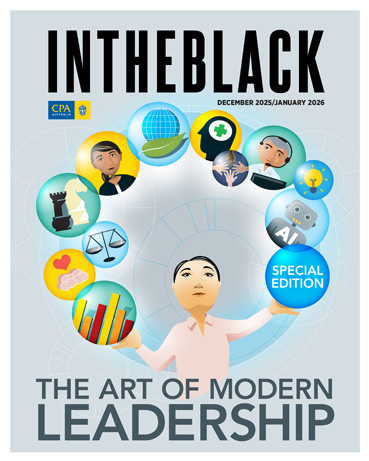Loading component...
At a glance
- Experts predict savvy accounting and finance professionals will focus on strengthening relationships and driving better results in the next 10 years.
- Expect to see more hires for accounting roles that blend technology, strategy and sustainability skills.
- While accounting roles will evolve, the number of people working in accounting will continue to grow.
In a world where blockchain auditors and carbon accountants are currently in demand, it is believed that by 2035, the trusted advisor role of accountants and finance professionals will be strengthened.
While there may be an AI agent helping to manage emails and crunch the financial data, this will allow accountants to focus on strengthening relationships and driving better results.
Professor Paul Andon, head of accounting, auditing and taxation at the UNSW Business School, says an exciting future awaits accountants and finance professionals who wish to take a futuristic view and move beyond merely being “excellent technical professionals”.
By taking advantage of automation, Andon believes that accountants’ cherished vision of ditching mundane duties and ramping up value-add work for clients can become a daily reality.
Registrations open

Adjunct associate professor Mary Dunkley FCPA, retired department chair of accounting economics and finance at Swinburne University of Technology, adds that the “DNA of accounting” is unlikely to change dramatically in 10 years or more.
She notes that the “father of accounting”, Italian mathematician Luca Pacioli, laid the groundwork for the double-entry system of accounting in the 1500s.
"We want a dose of scepticism. We also need a critical mind when interpreting and communicating data, and I don’t think those core DNA attributes will change."
“Whether it’s 2035 or 400 years ago, accounting DNA is grounded in ethical reasoning and enquiring,” Dunkley says. “We want a dose of scepticism.
We also need a critical mind when interpreting and communicating data, and I don’t think those core DNA attributes will change.”
While Dunkley concedes that ChatGPT and other large language models will reshape accounting practices, she expects smart human beings to be in greater demand than ever as they test, question and act on the results of algorithms. “Such a skill will be paramount for accounting,” she says.
Will job titles really matter?

The alphabet soup of potential job titles is likely to expand by 2035 to include chief automation officer (CAO), chief data officer (CDO), chief value officer (CVO) and a twist to the chief ecosystem officer role.
The positive news is that accountants will still be needed, according to Scott Copeland, program director of accounting at University of South Australia. “Some people say we won’t need accountants in the future and that the profession is dying. I can’t see that happening.”
This observation is backed by official projections from Jobs and Skills Australia, and Australia’s Victoria University. They forecast that the number of accountants in Australia will grow from 238,000 in May 2023, to 259,000 by May 2028, and reach 280,000 by 2033. These predictions don’t include the related area of finance manager, which is expected to record even stronger growth.
"Some people say we won’t need accountants in the future and that the profession is dying. I can’t see that happening."
Copeland is unsure if the specific titles of executives will overly matter, but he does foresee that the current chief information officer (CIO) role will become more significant.
Rather than simply managing technology and hardware, he expects CIO equivalents will develop more strategies around the information and data at their disposal. Likewise, CEOs and CFOs will draw more heavily on data and technology specialists.
“A blend of skills will occur, and I can definitely see somebody coming up with titles similar to CVO, or some other fancy acronym, to describe the fact that you actually understand how the business works and how everything ties together.”
Recruiter Michael Edelstein CPA, who specialises in senior placements within accounting firms across Australia, anticipates that the CFO role will “continue to exist for a long time yet”.
“That role will expand, as it has over many decades, from simple financial management to more of a strategic role and the more recent focus on automation and digital projects,” he says.
“Net-zero and other regulatory obligations represent yet another evolution of the CFO role, whereby their scope will need to be more holistic as governments prioritise environmental, social and governance (ESG) targets. So, their knowledge and skills will need upgrading.”
Data Visualisation and Storytelling
Accounting for net zero

One of the challenges for CFOs, according to Edelstein, will be balancing profit and business growth objectives while ensuring they adhere to sustainability regulations and disclosures.
Professor Hadrian Geri Djajadikerta, accounting discipline lead in the Faculty of Business and Law at Curtin University, says that as automation and AI handle structured tasks, new accounting roles will shift to data analysis, financial modelling and strategic advisory. He says the roles will also reflect the further integration of ESG metrics into financial reporting and assurance.
“With blockchain and digital assets rising, accountants will also tackle challenges like auditing decentralised ledgers and managing digital currencies,” he says.
In a net-zero economy, Djajadikerta expects more hires for sustainability accountants and ESG data analysts as companies seek to improve measuring and reporting of their social and environmental impacts, while chief sustainability officers (CSOs) will have more power.
“Green finance specialists and impact investment analysts will support the funding and management of sustainable projects, while climate risk managers will assess and mitigate the financial risks associated with climate change. Expertise in ethics and compliance will also become increasingly essential to navigate more complex regulatory landscapes.”
Skills for tomorrow

Experts are adamant that the terminology around “soft skills” must change. After all, there is nothing soft about skills such as communication, teamwork, critical thinking, problem-solving, collaboration and emotional intelligence.
“Critical thinking and problem-solving skills are key, and these are skill sets that still require human judgement and thought processing,” says Jeanette Ng FCPA, associate professor, business, communication and design at Singapore Institute of Technology.
Ng believes programming and coding skills will become “a norm” for accounting undergraduates, despite a long-held resistance among many students to sign up for computer science courses. “Educators have to find new ways to teach programming and coding skills to make it palatable to this group,” Ng says.
As businesses focus on renewable energy, climate risk, the circular economy, sustainability reporting and green finance, Ng expects sustainability roles to become more entrenched.
Such trends will put pressure on educational institutions to upskill students.
“Accounting and finance education must evolve quickly to meet the demands of a net-zero economy and an increasingly complex financial landscape,” Ng says.
“By integrating sustainability, technology and specialised accounting practices into our accounting curriculum and assessments, educators can ensure students are well-prepared to excel in emerging roles and industries.”
"By integrating sustainability, technology and specialised accounting practices into our accounting curriculum and assessments, educators can ensure students are well-prepared to excel in emerging roles and industries."
Over the next decade, Edelstein sees the roles and skill sets of accountants evolving in three critical ways. First, they will be required to manage global teams and the flexibility requirements of team members due to the increasing use of offshoring, remote working and flexible work practices.
“There will be a much bigger focus on people and management skills that enable someone to create a cohesive work environment,” Edelstein says.
Second, accountants will have to be “tech-savvy to the point where the best employees should automate themselves out of a job and then proceed to another project with higher value-add work”.
Third, the focus will shift to utilising internal and external data to “add value to the company’s future decision-making, strategy and direction”.
Yulius Santoso, finance and accounting recruiter, and founder of HR and talent agency Lucky You Found Me, agrees that the offshoring trend will continue at pace in the next decade as accounting and finance companies seek to build in workflow
and cost efficiencies while outsourcing highly repetitive, low-value activities. Likely target countries for such work will include the Philippines, India, Malaysia, Vietnam and Sri Lanka.
While offshoring may free up accountants to do more interesting value-add work, Santoso says it comes with risks. With “repetitive skills” being outsourced, how will firms train the next generation of accountants in some of the fundamentals and equip new graduates with basic skills?
“If you have a graduate coming out of university and they are not exposed to this type of work, the fundamentals can be lacking. We’re seeing this already because of the widespread use of software such as Xero,” Santoso says.
AI Ethics and Governance for Accountants
AI: friend or foe?
Toby Walsh, scientia professor of artificial intelligence at University of New South Wales describes AI as the “greatest gold rush in human history”. He notes that about A$1 billion is spent on the development of the technology every day, which has led to an unprecedented take-up of the technology, giving it the capacity to revolutionise business.
Walsh says while ChatGPT is a generic tool that can answer almost any conceivable question, the real excitement for accounting firms will be around generative AI's is long-term ability to tackle the specific.
“You want something that speaks to accounting, to finance, to insurance or to whatever it is your business does. In the next iteration, we’re going to see tools that focus on particular workflows.”
Fellow UNSW professor Paul Andon believes AI provides the potential for accountants to do things faster and with fewer resources.
“The opportunity with AI is that it can actually make us better at what we do.” To that end, he says AI is more than just an efficiency tool.
“AI is actually a smart friend. If you’re going into a meeting or if you’re going into a high-stakes negotiation, you can use AI to help you prepare to be a better version of yourself.”
Walsh expects AI and other tech tools to do more of the four Ds – dirty, dull, difficult and dangerous work – including monitoring emails and dealing with data sets. “I see them very much as an assistant, by taking away the time-consuming and repetitive jobs, leaving us with more time to think about more important things.”
For accountants and other professional services firms concerned about confidentiality and ethical matters, Walsh says AI will morph into enterprise tools that will run on business machines and not share data with open AI channels.
He notes that while these tools are “still a little problematic” and that firms must be conscious of erecting robust firewalls, he is confident that accounting will thrive on the back of the rise
of AI and other technology advances.
“Yes, there will be some roles that get taken over by technology in 10 or 20 years,” Walsh says. “But I suspect we’ll have probably just as many accountants as today.”
A changing work model
In recent months, corporate giants such as Amazon, Goldman Sachs and Tabcorp have ordered workers to return to traditional offices, casting doubt over the future of remote working. Meanwhile, a KPMG survey reveals that more than 80 per cent of CEOs believe white-collar workers will be back in the office five days a week by 2027.
Workplace expert Michelle Gibbings believes remote working for accountants is here to stay, but she expects a broader use of the term “flexible work” to emerge. “It’s not just about the flexibility of working from home, it’s also about the flexibility around how you do the work and when you do it.”
Gibbings expects greater reliance on “globally distributed teams” – that is, a group of people who work at the same company, but who may not be physically in the same place, or the same country. These teams can work together at the same time, in sprints, or separately, and offer the prospect of faster, more efficient work. “We’ve got globally distributed teams now, but we’ll probably see it happen more frequently in the future,” Gibbings says.
She also envisages human employees having AI agents working in tandem to help complete everyday tasks. “You could have an AI agent ‘sitting’ in the room and they’re the ones who are capturing all the information and data.”
The big change by 2035, according to Gibbings, is that these autonomous intelligent systems are likely to progress from doing just process-driven, manual tasks to taking on more advanced duties.
Dunkley expects HR experts within accounting firms to become more crucial as they assess the value of the inputs from individuals, versus the costs they incur on payrolls. Part of the analysis will be appraising the costs of having a person work from home two days per week.
“There are explicit and implicit costs. The cost is potentially going to be that you don’t have the same office relationships, but it depends on personalities. Given these complexities, I think HR will be a big area of growth in the next 10 years for accounting.”
Positive outlook
As he ponders the future for accountants, Santosa has no doubt that “continuous learning” will be key if accounting firms and practitioners want to flourish in a fast-changing world.
“Lifelong learning is not a new concept, but I think it’s going to be even more prevalent for the next 10 years and more,” he says.
For graduates and young accountants now weighing up their options for a successful future, Djajadikerta recommends roles that blend technology, strategy and sustainability skills.
“Specialising in sustainability accounting or ESG reporting will be highly valuable as companies focus on environmental and social responsibility,” he says. “Data-analysis roles, such as data scientists in finance, will also be crucial as AI and big data drive financial decision-making.”
Nguyen Tan Quan ASA, senior associate at PwC Vietnam notes that AI is “undoubtedly the next big thing for the profession” but adds that many AI models are built on historical data.
“This can sometimes mean they’re not always aligned with the most current context, which could affect the accuracy of our decisions,” he says.
“In my view, AI should augment our work, not replace accountability. We own the numbers, no matter how they are generated.”
As a parting message, Dunkley urges accountants in the next decade and beyond to keep “aspiring to inspire people”.
“We should be inspiring the business community to show them that, ‘Yes, you can do this, and this is how you do it’,” she says.
How roles will change

Some roles and responsibilities will change when 2035 dawns, and Nguyen Tan Quan ASA, senior associate at PwC Vietnam, hopes to be part of the evolution.
Quan aims to be in a role equivalent to a CFO within 10 years, but he expects the job may well be “rebranded” as a CVO, or similar, and will require a combination of typical technical accounting skills and a digital transformation mindset.
“A new style of leadership will be needed to steer organisations on the path of innovation,” he says.
Irrespective of a changing profession, Quan believes the future role of accountants is secure in Vietnam as there is a statutory requirement for non-micro enterprise businesses to appoint a chief accountant to manage and audit an entity’s finances.
“No matter how the accounting role shifts, in the next decade in Vietnam, accountants will remain critical for all firms.”
Quan says PwC Vietnam is already seeing a glimpse of the future via ChatPwC – a GenAI chatbot that streamlines complex tasks and fosters collaboration between internal teams and clients. It assists the firm to stay up to date on regulatory changes.
“I think it’s helped us to improve our productivity,” he notes.

